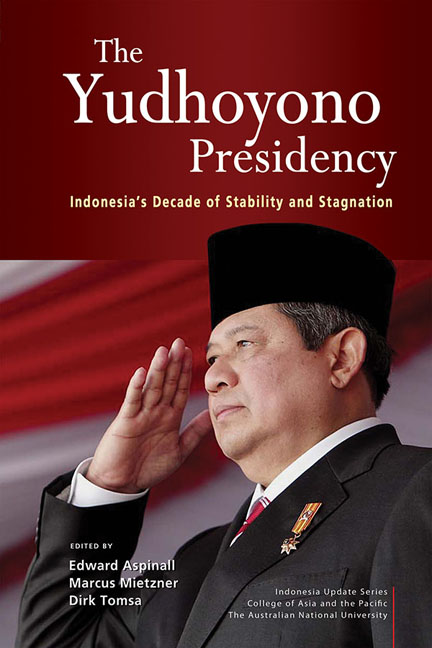Book contents
- Frontmatter
- Contents
- Tables and figures
- Contributors
- Acknowledgments
- Glossary
- 1 The moderating president: Yudhoyono's decade in power
- 2 Prologue Yudhoyono's legacy: an insider's view
- PART 1 PERSONAL, COMPARATIVE AND INTERNATIONAL PERSPECTIVES
- PART 2 INSTITUTIONS, POLITICS AND SECURITY
- 6 A balancing act: relations between state institutions under Yudhyono
- 7 Professionalism without reform: the security sector under Yudhoyono
- 8 Yudhoyono's legacy on internal security: achievements and missed opportunities
- 9 Toning down the ‘big bang’: the politics of decentralisation during the Yudhoyono years
- 10 The rule of law and anti-corruption reforms under Yudhoyono: the rise of the KPK and the Constitutional Court
- PART 3 GENDER, HUMAN RIGHTS AND ENVIRONMENT
- PART 4 THE ECONOMY AND SOCIAL POLICIES
- Index
- Miscellaneous Endmatter
10 - The rule of law and anti-corruption reforms under Yudhoyono: the rise of the KPK and the Constitutional Court
from PART 2 INSTITUTIONS, POLITICS AND SECURITY
Published online by Cambridge University Press: 19 May 2017
- Frontmatter
- Contents
- Tables and figures
- Contributors
- Acknowledgments
- Glossary
- 1 The moderating president: Yudhoyono's decade in power
- 2 Prologue Yudhoyono's legacy: an insider's view
- PART 1 PERSONAL, COMPARATIVE AND INTERNATIONAL PERSPECTIVES
- PART 2 INSTITUTIONS, POLITICS AND SECURITY
- 6 A balancing act: relations between state institutions under Yudhyono
- 7 Professionalism without reform: the security sector under Yudhoyono
- 8 Yudhoyono's legacy on internal security: achievements and missed opportunities
- 9 Toning down the ‘big bang’: the politics of decentralisation during the Yudhoyono years
- 10 The rule of law and anti-corruption reforms under Yudhoyono: the rise of the KPK and the Constitutional Court
- PART 3 GENDER, HUMAN RIGHTS AND ENVIRONMENT
- PART 4 THE ECONOMY AND SOCIAL POLICIES
- Index
- Miscellaneous Endmatter
Summary
President Susilo Bambang Yudhoyono came to office at a pivotal time for rule-of-law and anti-corruption reforms in Indonesia. The two institutions at the forefront of these reforms were already established by the time he was inaugurated on 20 October 2004, but they had not been operating long and were still finding their feet. The first, the Constitutional Court, was established just one year earlier, on 15 October 2003. The second, the Corruption Eradication Commission (Komisi Pemberantasan Korupsi, KPK), had been working since mid-December 2003. The Jakarta Anti-Corruption Court (Pengadilan Tindak Pidana Korupsi, Tipikor Court), which tried all of the KPK's defendants, handed down its first decision in March 2005, well after Yudhoyono took office.
During Yudhoyono's presidency, the Constitutional Court and the KPK firmly established themselves within a largely unaccommodating political environment, and then actively and professionally performed their functions, which have been critically important to overall post-Suharto reform. As we shall see, both institutions had a relatively slow start during Yudhoyono's first term, with the KPK choosing to target small fry and the Constitutional Court invalidating unconstitutional legislation. However, as Yudhoyono's second term commenced, both institutions became perceptibly emboldened. The KPK began to target powerful politicians, while the Constitutional Court adopted more aggressive decision-making practices, such as amending constitutionally questionable legislation rather than simply invalidating it.
Although the KPK and the Constitutional Court became very popular with the public, they also faced significant obstacles, put in their path mainly by those whose interests were adversely affected by their work. For example, several KPK commissioners were arrested by police or prosecutors who either were themselves under KPK investigation or appeared to act at the behest of others being investigated. The paucity of evidence to support these arrests led to speculation that the commissioners had been framed. Sections of the national parliament—many members of which had been investigated or prosecuted by the KPK— threatened to cut the commission's budget and powers, and to reduce the potency of the anti-corruption courts. The Constitutional Court faced two efforts—one through a statute passed in 2011 and the other through a government regulation in lieu of law (peraturan pemerintah pengganti undang-undang, perppu) issued by the president himself in late 2013—to rein it in and to ensure that allegations of judicial misconduct could not be handled internally.
- Type
- Chapter
- Information
- The Yudhoyono PresidencyIndonesia's Decade of Stability and Stagnation, pp. 175 - 196Publisher: ISEAS–Yusof Ishak InstitutePrint publication year: 2015

